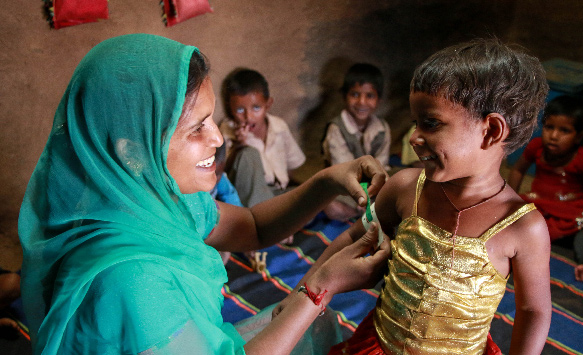Health Programs & Their Impact
Maternal Healthcare—Traditional Birth Attendants and Obstetric Insurance
323 Traditional Birth Attendants (TBAs) live and work in 152 villages where they perform deliveries and care for pregnant women both before and after delivery. TBAs delivered care to 5,500 women in the last calendar year, organized more than 600 informational meetings, and remain the primary providers of maternal healthcare in many areas. While TBAs provide safe and hygienic home births (nearly 2,000 last year), they encourage women to deliver at hospitals when necessary, accompany them throughout the arduous multi-hour journey, handle medical complications that arise en route, and are key advocates for mothers in overcrowded and bureaucratic public hospitals. In addition, Seva Mandir has piloted an obstetric insurance program that, for a Rs. 350 ($6) premium, has granted 229 women access to antenatal and delivery services at Seva Mandir-accredited hospitals, and increased antenatal care from 54% to 74%.
Infant and Early Child Healthcare (Balsakhis)
Balsakhis are a cadre of young women selected from the villages and given intensive training on various aspects of childcare and health. Seva Mandir has trained over 100 of these community health workers who provide care to over 2,000 children annually. In addition to counseling new mothers on critical aspects of newborn care including breastfeeding, weaning and appropriate nutrition, Balsakhis also chart child growth from birth to 3 years, treat basic illnesses and refer serious cases to hospitals, all at a salary per worker of just Rs. 2100 ($35) per month. Seva Mandir also enables Balsakhis to play an important public health role by providing training in data collection, for example, on pregnancy and child nutrition, that informs broader monitoring so that care priorities can be discerned and addressed.
Immunization
“Seva Mandir’s immunisation program is one of the most impressive we have ever evaluated, and probably the one that has saved most lives.” — Abhijit Banerjee & Esther Duflo, ‘Poor Economics’ (2011)
Seva Mandir’s immunization program has nearly doubled child immunization rates from 35% to 60% in many villages. It does so by increasing both supply and demand: regular camps are held on well-publicized dates, and parents receive incentives (lentils) for every shot of vaccine their child receives. Last year the camps immunized 1,324 children across 113 villages at a cost of Rs. 2,400 ($41) for a camp serving 100 families. The camps are also hubs for other medical services, and last year treated 2,429 children for common illnesses and provided additional antenatal checkups.





















